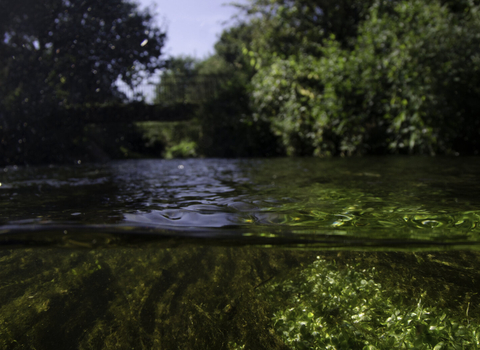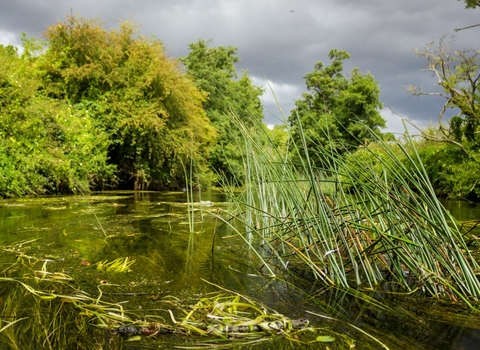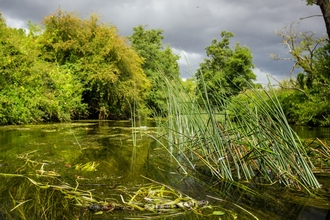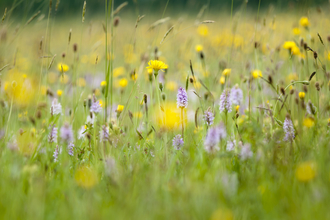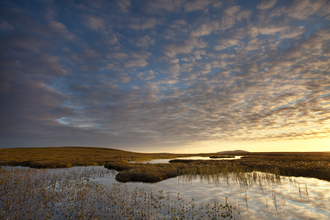Life in the River Wye is silently slipping away
The crisis can be seen in the death of fish and insects, the unrelenting loss of aquatic flowers, and the huge algal blooms that turn the river green and stinking during long, hot spells.
Phosphate, the chemical that creates these algal blooms and the resulting loss of oxygen in the water, is invisible. But you can see, and often smell, the main cause of the problem. Manure from chicken farms making its way into the Wye.
Powys now has more than 150 Intensive Poultry Units housing an estimated 10 million chickens. This is industrial-scale agriculture with factory-like production lines of up to 100,000 plus birds at each site, making Powys Europe’s largest producer of free-range eggs.
Research suggests an extra 2,000 tonnes of phosphates a year are being tipped and spread via muck onto land in the overall Wye catchment area. This equates to 1.5 million tonnes of manure being spread within the catchment area, which exceeds what is required for crop growth by many times, every year.
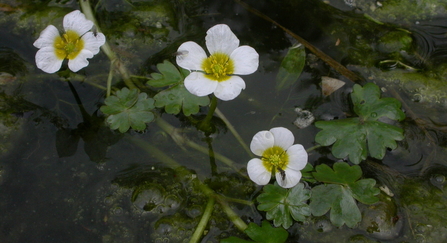
Water crowfoot - Philip Precey
What is being done?
Welsh Government, Natural Resources Wales, and Powys County Council have a legal obligation to act to prevent further harm to the Wye catchment. There is now a moratorium on any new development on the River Wye.
Welsh Government has made a commitment to protecting the River Wye from further damage through the introduction of the new Water Resource (Control of Agricultural Pollution) (Wales) Regulations 2021. These will bring new powers to manage manure but not for another two years.
Although these are very welcome, further action is needed to deal with the management of existing waste. With an estimated 8.5 million chickens on permitted units in Powys, the scale of the impact on biodiversity and the health of the river is severe.
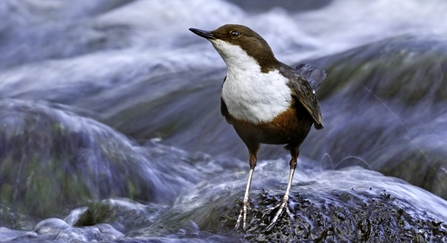
Dipper - Andy Rouse/2020VISION
What more is needed?
We must put nature into recovery. When in good health, nature has the power to tackle climate change but it needs our help to get there.
We believe the following actions are needed to secure a future for the Wye River:
1. All Intensive Livestock Units should be licenced and require planning permission
Presently farm businesses containing fewer than 40,000 chickens or 1,000 pigs do not need a license to operate or require specific planning permission. It must be noted that 40,000 chickens can produce up to 1,000 tonnes of manure a year. The guidance is not to spread more than 8 tonnes of poultry manure per ha in a single application. This means that 40,000 Intensive Livestock Units (IPU’s) require 125ha of land whilst the average farm size in Wales is 48 hectares. Therefore, the volume of manure far exceeds the available land there is for spreading.
Natural Resources Wales and Powys County Council don’t have accurate records of the number of IPU’s. We, therefore, propose that all IPU’s be licensed and require planning permission. Also, manure is not a licensed waste if it can be deemed to derive an agricultural benefit. If reclassified, manure could then be tracked throughout the supply chain, including recording quantities spread and where.
2. Soil nutrient tests to be made mandatory
Each year, at least 30% more nutrient is going onto the land within the Wye Special Area of Conservation (SAC) than is required to fertilise crops. Presently there is no monitoring of manure management plans, and the plans that are submitted against planning applications lack any detail.
We are calling for soil nutrient tests, for nitrogen and phosphate to be made mandatory and caps upon the level of phosphate, not just nitrate, and that these levels are actively monitored and enforced.
3. Proactive and determined monitoring and enforcement
Natural Resources Wales must be enabled to take proactive and determined monitoring and enforcement if we are to affect real shifts in the attitude towards nature positive land management and to reduce pollution. In particular, they should be enabled to fully monitor compliance with the existing Slurry, Silage, and Agricultural Fuel Oil (SSAFO) regulations.
4. Limit the time that temporary manure heaps can remain
At the moment, a temporary manure heap can stay in situ for 12 months. High levels of leaching and run-off occur at this time, even on flat ground. We recommend that this period is reduced to three months and that all heaps are to be covered.
5. Investment into development of new markets for chicken manure
With calls to ban peat compost, the nutrient within chicken manure could have value. Mixing manure with bracken and green waste could create rich organic and peat-free compost. There are calls for more of this waste to be disposed of by anaerobic digesters (AD). These breakdown the manure releasing methane, a biogas. There are two problems methane as a greenhouse gas is 25 times more potent than carbon dioxide and often AD plants need top-up material, normally maize which has raised concerns as land is now being taken out of food production to grow this intensive crop to feed AD units.
6. New Agricultural (Wales) Bill to include National Minimum Standards
The new Agricultural (Wales) Bill and new Sustainable Farm Scheme should include National Minimum Standards and baseline regulations (commonly referred to as General Binding Rules or Basic Measures) to ensure pollution is prevented at the source. Also, a requirement to have a Farm Sustainability Plan that focuses on sustainable stocking.
7. Cumulative effects of nutrients must be taken into consideration across all Special Areas of Conservation
The cumulative effects of nutrients must be taken into consideration in the Wye Special Area of Conservation; as part of the planning process, we are calling for this to apply to all Special Areas of Conservation in Wales.

